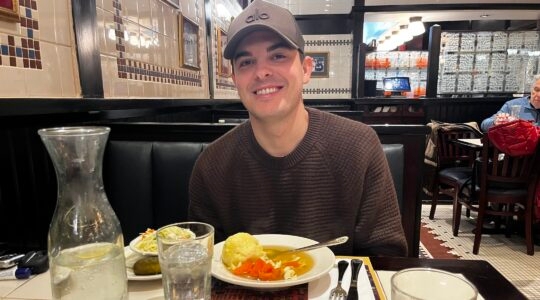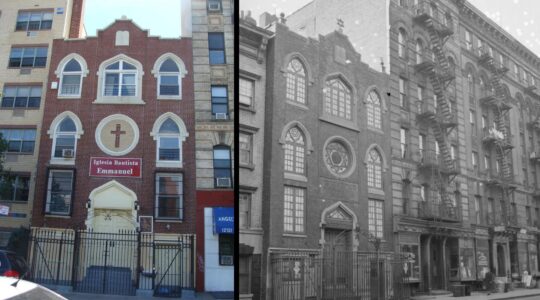The book of Ruth begins with the line, “In the days when the judges judged’ (וַיְהִ֗י בִּימֵי֙ שְׁפֹ֣ט הַשֹּׁפְטִ֔ים, Ruth 1:1). The Book of Ruth, traditionally read as part of the service on Shavuot, opens by setting its narrative in the time of the Book of Judges, placing it against a backdrop of upheaval, insecurity and danger. The two books also connect thematically through their depictions of journeys. Travel occurs frequently in the Book of Judges: Gideon crosses the Jordan (Judges 8:4); Yiftach flees from his brothers (Judges 10:3); and Samson goes down to Timnah, where he takes a Philistine wife (Judges 14:1). The final chapters of the Book of Judges recount the journeys of unnamed characters in a series of malevolent incidents: a wandering Levite sanctions Micah’s idol worship (Judges 17:12-13); the traveling Danites then take these idols and set up their own shrine (Judges 18:30); and finally the heinous crime perpetrated on the concubine of Gibeah begins with a decision to go on the road instead of staying another night at her father’s house (Judges 19:10). Naomi and Ruth travel during a time of uncertainty in the land as a whole, but also against this backdrop of journeys that lead to tragic consequences.
Naomi and Ruth travel during a time of uncertainty in the land as a whole, but also against this backdrop of journeys that lead to tragic consequences.
Perhaps it is more meaningful to consider Naomi and Ruth on similar but separate journeys, as their situations differ in significant ways. Ruth is a foreigner coming ‘to a people that [she] does not know’ (תֵּ֣לְכִ֔י אֶל־עַ֕ם אֲשֶׁ֥ר לֹא־יָדַ֖עַתְּ תְּמ֥וֹל שִׁלְשֽׁוֹם, Ruth 2:11); furthermore, she is seemingly unaware of the conventions that govern this society, most notably of the gleaning fields. From the onset, she is disadvantaged by her Moabite ancestry–the fact that she is from Moab is brought up frequently in the text when she is referred to by the other characters. In Torah law, Moabites are prohibited from joining Israelite society for two reasons: they refused food and water when the Israelites were leaving Egypt, and they conspired with Balaam to curse the nation of Israel (Deuteronomy 23:4). However, Ruth proves capable of overcoming the misdeeds of her ancestors. She is the one who furnishes sustenance for her mother-in-law, behavior that Boaz praises by blessing her (Ruth 2:11-12). Unlike many of the journeys in the Book of Judges, Ruth’s ends joyfully with the celebration of her marriage to Boaz and the birth of a son that begins the Davidic dynasty.
However, Ruth proves capable of overcoming the misdeeds of her ancestors. She is the one who furnishes sustenance for her mother-in-law, behavior that Boaz praises by blessing her (Ruth 2:11-12).
If Ruth’s journey is precarious because she is heading to the unknown, Naomi’s is precarious for the opposite reason: she is heading to a place that she knows, but not one where she knows what to expect. The reasons for her departure from Bethlehem, as recounted in the opening verse of the Book of Ruth, are clear enough on the surface: there is a famine and the family travels to Moab to find food. However, the rabbis viewed this decision to leave as the first step in the downfall of Naomi, her husband, and their sons:
And Rabbi Shimon ben Yochai would likewise say: Elimelech and his sons Mahlon and Chilion were prominent members of their generation and were leaders of their generation. And for what reason were they punished? Because they left Israel to go outside of Israel, as it is stated: “And all the city was astir concerning them, and the women said: Is this Naomi?” (Ruth 1:19). What is the meaning of the phrase: “Is this Naomi”? Rabbi Yitzhak says that the women said: Have you seen what befell Naomi, who left the land of Israel to go outside of Israel? (Bava Batra, 91a)
Naomi too chose to leave Bethlehem at a time of distress, so she is viewed by the villagers as equally at fault for the tragedies she has experienced.
When Naomi returns to Bethlehem, she publicly bemoans her state:
“Do not call me Naomi,” she replied [to the women of the town]. “Call me Mara, for Shaddai has made my lot very bitter. I went away full, and the LORD has brought me back empty. How can you call me Naomi, when the LORD has dealt harshly with me, when Shaddai has brought misfortune upon me!” (Ruth 1:20-21)
This declaration is not the first to express the profundity of her despair. Naomi sought to send away her daughters-in-law while traveling–Orpah acquiesces to Naomi’s exhortation that she return to Moab (Ruth 1:14). It is hard to imagine that Naomi would have been so insistent if she envisioned an optimistic future awaiting in Bethlehem. Yet despite her fears, she is blessed in the end (Ruth 4:14), blessings that come from the same women who asked: ‘Is this Naomi?’ when she initially returned.
As our society takes the first tentative steps to reopening during this time of COVID-19, we also find ourselves embarking on a journey, one whose outcome is impossible to determine.
As our society takes the first tentative steps to reopening during this time of COVID-19, we also find ourselves embarking on a journey, one whose outcome is impossible to determine. In some ways, we will be treading on new ground as we re-establish our lives in ways that do not jeopardize the health of others–concerns that few of us have experienced before. Yet we will also be returning to patterns that we know, accompanied by disruption and incongruity given the sudden economic and societal changes that we have experienced. In other words, we are simultaneously Ruth and Naomi, in that we are heading to the unknown and to the known.
But if we can be brave enough to seek out what we need in our vulnerability–both from ourselves and from others–we too can establish a better future than we could currently imagine.
The blithe moral of this story, of course, is to say that we should all strive to be like Ruth: patient, generous, and selfless in our actions. But my guess is that we all are sometimes akin to Naomi in the opening chapter of this book: frightened by the voyage that we are taking; uncertain that we are on the best path; with our worry blinding us to the potential that the future holds. Naomi’s happy ending comes about not due to any dramatic act, but because she stopped trying to convince Ruth to leave her (Ruth 1:18). One of the many lessons from this book, then, is the importance of being vulnerable to those around us at a time when we are feeling most hopeless. As we recover from the challenges that social distancing instigated, it may be hard to imagine that our society can return to a place of normalcy. But if we can be brave enough to seek out what we need in our vulnerability–both from ourselves and from others–we too can establish a better future than we could currently imagine.
Zoë Lang is an active member of the Cambridge, MA Jewish community and the special events coordinator for the Cambridge-Somerville Open Beit Midrash. She holds a PhD from Harvard University and currently serves as the Systems Implementation Consultant at Maimonides School in Brookline, MA.
Posts are contributed by third parties. The opinions and facts in them are presented solely by the authors and JOFA assumes no responsibility for them.
If you’re interested in writing for JOFA’s blog contact dani@jofa.org. For more about JOFA like us on Facebook or visit our website.
The New York Jewish Week brings you the stories behind the headlines, keeping you connected to Jewish life in New York. Help sustain the reporting you trust by donating today.




